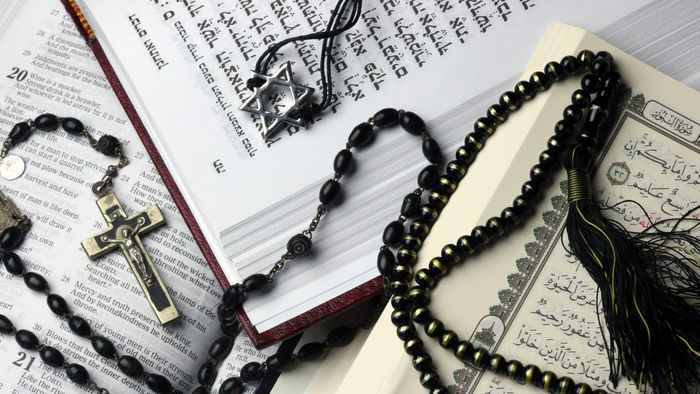The Prophet Muhammad was born in the Arabian Peninsula in a time where complete savagery, the absence of law and order was an everyday fact of life. However, in a short span of time, he became the means to form a bright civilization. He applied the justice revealed in the Qur’an to the inhabitants of countries that were taken over and made agreements with them that would contain both sides. Consequently, the people of these countries, regardless of their faith or ethnicity, were pleased with his justice. Taking him as their role model; the countries in the Middle East were home to Christians and Jews along with Muslims for the longest time. However, these beautiful People of the Book have had to abandon their homelands in the last decades. Let’s investigate the reason why.
The wars and the persecution caused the dramatic fall of the Jewish and Christian population in the Middle East. Nearly all the Jews in the Arab countries have been forced to flee their respective motherlands since the end of WWI. In the documentary “The Forgotten Refugees”, Levana Zamir, a Jew who fled Egypt at the time, describes the state of affairs. “Now, you can find in Egypt only perhaps 20 or 30 old Jews.” In 1944, there were 55,000 Jews left in Yemen, 150,000 in Iraq, 140,000 in Algeria, 80,000 in Egypt, 38,000 in Libya, 265,000 in Morocco, 105,000 in Tunisia, 100,000 in Iran, 27,000 in Syria and 5,666 in Lebanon. But today, except for a few thousand Jews in Morocco, Tunisia, and Iran, the Jewish population in the aforementioned countries does not exceed “dozens”.
After being exiled from these lands, due to increasingly restrictive laws, discrimination and mounting anti-Jewish attacks, the rest were forced to leave the region in time. The article “The Middle East’s Greatest Untold Story“ by former Ambassador to UN Ron Prosor, featured in the Huffington Post, talks about this animosity.
“Within years virtually all of Iraq’s 2,500-year-old Jewish community had fled, emptying the country of many of its greatest artists, musicians, and businessmen. Similar scenes played out across the region, from Egypt to Syria to Libya to Yemen. New, draconian laws prevented Jews from public worship, forced them to carry Jewish identity cards, and seized billions of dollars in their property and assets.”
When we take Christians into consideration, we encounter a similarly painful scene. Christianity has all but disappeared in the Middle East, the very region where it was born. Christian Copts began leaving Egypt in large numbers following the 1952 Revolution. In the last decade or so, the region has turned into a place where it was too hard for them to keep living due to the numerous church attacks. Along with such atrocities, the Copts are also exposed to murder or plots to bring them harm or death. They are also accused of blasphemy or apostasy without the necessity of bringing evidence against them and eventually, they are usually sentenced to prison.
These incidents are the repercussions of the extremist mindset, which is completely divorced from the accurate teachings of the Qur’an; I strongly criticize this mentality. The root cause of this system is that the majority of Muslims have essentially abandoned the Qur’an, assuming the various books of interpretation, hadiths and fatwas as rules to be followed. Most people in the Islamic world consider the declarations of religious leaders as a rule and therefore every religious community begins to have its own practices. These people have also come to adopt fabricated hadiths consisting of statements of hate against the People of the Book. But, in truth, Islam requires Muslims to show understanding and respect to their beliefs. God commands them to be just even when it is not in their own interests.
According to the Qur’an, all Muslims have a responsibility to accept all the true faiths and true prophets, not differentiating between any of them (Qur’an, 2:136). God informs Muslims that among the People of the Book “there is a group who guide by the truth and act justly in accordance with it” (Qur’an, 7:159). As they basically rely on God’s revelation, the People of the Book have moral precepts and know what is lawful and what is not. For this reason, it is lawful for Muslims to eat the food cooked by the People of the Book. In the same way, permission has been given for a Muslim man to marry a woman from among the People of the Book (Qur’an, 5:5).
In fact, during the times of Islamic governance, especially at the time of the Prophet Muhammad, Muslims embraced the Christians and Jews with great respect and compassion. The Prophet was just and compassionate toward them and tried to create a conciliatory atmosphere among these three religious communities. Several accords allowed Christians and Jews to live as autonomous religious communities.
Additionally, in Uthman’s era, during the conquest of the Armenian city of Dabil, the assurances given to Christians, Jews, and Zoroastrians guaranteed the protection of all places of worship. He allowed them to restore damaged churches and build new monasteries. For instance, the St. Sergius monastery outside of Medain was destroyed by Patriarch Mar Amme and rebuilt during Uthman’s reign. Uqba, the governor of Egypt, contributed to a Nestorian monastery, the Church of Edessa was restored during the reign of Mu’awiyya and the Saint Marcos Church was built in Alexandria. The persistent existence of churches and synagogues in Egypt, Palestine, Jordan, Syria, and Iraq proves Muslims’ respect for other faiths. The Sinai Monastery, with a mosque adjacent to it, is a significant pilgrimage center on Mount Sinai.
Similarly, the Ottoman Empire set an example with its highly courteous attitude towards Jews fleeing Spanish tyranny as they took refuge on the Ottoman soil. Being expelled from Spain and encountering further hardships in other countries where they had sought shelter, many Jews died of hunger at the gates of cities. Sultan Bayazid welcomed the Jews into Ottoman lands and demanded that the people show them respect.
Another example of the buoyant lives of Christians and Jews on Muslim soil was seen in Muslim Andalusia referred to as La Convivencia. This state, which founded the most advanced civilization in Europe at that time, was characterized by the understanding exhibited toward members of other Divine faiths. Convivencia – or coexistence – was everywhere – in art, science and even worship. The Church of St. Roman (Toledo, 13th century), for example, is an outstandingly beautiful Christian church built by Muslim craftsmen and contains Muslim style and themes. Apparently, two faiths not only used each other’s skills but also respected each other’s cultures. The members of the three Divine religions cooperated to develop one of the highest civilizations our world has ever witnessed and they succeeded.
As seen in the cited examples, Muslims have enjoyed great company with Jews and Christians throughout history. In the Muslim lands they inhabited, the People of the Book engaged in commerce and acquired property as they wished, engaged in the trade or profession of their choice, and were appointed to posts in the state administration and even in royal palaces. They enjoyed the freedom of expression and made scientific and cultural achievements that are still with us today. Therefore, Muslims should fasten on to the teachings of the Qur’an and leave aside the spirit of hatred spread by the extremists’ mistaken worldview. They should replace fallacious beliefs with accurate ones and turn back to the times where the members of the three Divine religions coexisted.







Comments (7)
[…] Read the full article from the Source… […]
[…] Read the full article from the source… […]